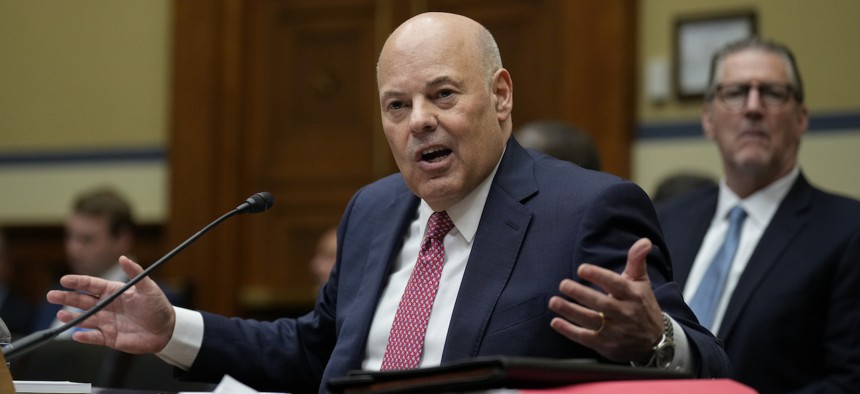
Postmaster General Louis DeJoy testifies during a House Oversight Subcommittee on Government Operations and Federal Workforce hearing on May 17, 2023. The hearing examined the implementation of the Postal Service Reform Act of 2022. Drew Angerer/Getty Images
DeJoy Defends His Legacy to Congress Even as He Acknowledges USPS is Falling Short of Goals
The postmaster general leaves workforce cuts and major operational changes on the table as the Postal Service confronts unforeseen headwinds to financial stability.
The U.S. Postal Service could see additional workforce reductions and attempt to eliminate offerings it deems “too costly,” the agency’s chief told lawmakers on Wednesday, though he expressed optimism that his reforms will soon stabilize its operations.
At his first congressional appearance in more than two years, Postmaster General Louis DeJoy faced a less contentious audience than he has in earlier testimony with lawmakers from both parties on the House Oversight and Reform Committee repeatedly thanking him for his overall efforts and assistance in pushing forward a key reform bill last year. Still, they sought to hold his feet to the fire on his plans to consolidate facilities, lingering service issues and the safety of the workforce. DeJoy stressed that he was “not happy” with his rate of progress to date in turning the agency around, but vowed to ultimately see his vision through and get USPS out of the red.
Lawmakers in both parties at times criticized DeJoy for taking an overly callous approach, such as when he responded to complaints from Rep. Nanette Barragan, D-Calif., that employees in her district were working at facilities that got as cold as 30 degrees because “we have what we have”—though he did maintain his team is working tirelessly to address working conditions throughout the agency despite having insufficient funds to do so. Rep. Jake LaTurner, R-Kan., also implored the postmaster general to be more thoughtful after he expressed little sympathy for companies the congressman said are struggling due to drastic increases in periodical delivery prices.
“What are we supposed to do as an organization that is losing money as a whole? Suck it up?” DeJoy asked. “That’s not what I was brought here to do.”
DeJoy repeatedly bemoaned the headwinds he is facing to change the Postal Service, blaming inflation, stakeholder resistance and burdensome regulations for holding him back. The Postal Regulatory Commission, he said, has “actively participated in the destruction of the agency over the last 15 years.”
The postmaster general highlighted his efforts to improve the workplace experience for USPS employees, including steps to divert crime, create better career development opportunities and modify facilities to make them more worker-friendly. Still, when asked by Rep. Becca Balint, D-Vt., if he would commit to maintaining the “size and work hours of the postal workforce,” DeJoy rejected the notion entirely.
“I could not possibly commit to something as broad as that,” DeJoy said, though he added he was committed to ensuring USPS adds staff wherever it is necessary.
While DeJoy said his upcoming changes to the postal network will significantly reduce inefficiencies and excess costs, there may be some areas that require more drastic change. He last week alluded to “more aggressive actions” that would be necessary to overcome unforeseen roadblocks on his path to getting his agency back in the black.
“I will be able to tell you what exactly, operationally, is too costly to do,” DeJoy said. “We may have to come up with something else.”
While DeJoy said he will squeeze costs by cutting 400 processing centers down to 60 regional mega-sites—“We’re going to consolidate,” the postmaster general said—he also vowed to identify new sources of revenue, as called for in last year’s reform bill. He said USPS could leverage its network by creating shared workplaces with small businesses, offering lock box services and stocking critical infrastructure such as hospital supplies.
“We’re going to chase after this stuff,” DeJoy said.
Prior to the hearing, three of the top Democrats on the committee, Reps. Jamie Raskin, D-Md., Kweisi Mfume, D-Md., and Gerry Connolly, D-Va., sent a letter to DeJoy requesting more specific steps USPS would take to protect employees amid a recent surge in violence directed at letter carriers and other mail-related crimes. According to the Postal Inspection Service, robberies of letter carriers more than tripled from 2018 to 2021 and then, according to an Associated Press report, spiked by 78% in 2022. USPS recently said it is on pace to well exceed last year's total in 2023. USPS announced last week it is replacing nearly 50,000 of the universal keys that letter carriers carry and criminals often target with an electronic alternative and "hardening" blue collection boxes to make them more difficult to breach.
“While we applaud the Postal Service’s and Postal Inspection Service’s actions to finally start addressing the massive increase in postal crime and theft,” the lawmakers said, “we remain gravely concerned for the physical safety and wellbeing of our postal carriers and demand swift action. We must do more to protect our federal workforce.”
DeJoy rejected that he possessed the authority or capacity to allow the limited number of Postal Police officers to conduct patrols, instead suggesting he would work with employees to increase their awareness of criminal activity.
“I recognize that our success is the ability of people to conduct commerce through the Postal Service, and crime, throughout history, has always been a deterrent to commerce,” DeJoy said. We're going back and forth with our employees and communities, asking people to be more alert to these things.”







